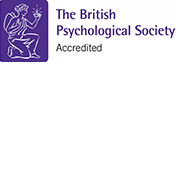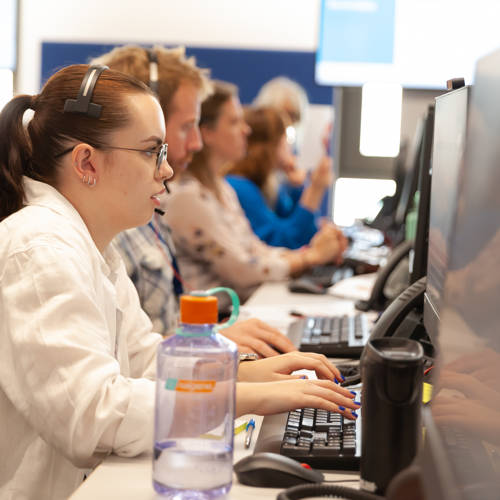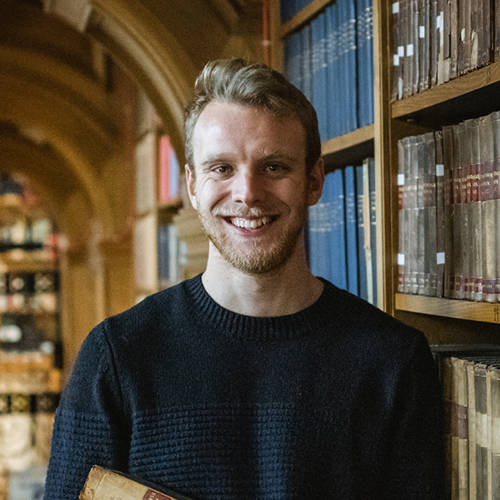Overview
Get ready with a foundation year and learn the foundational skills and knowledge to complete a full Honours degree. You'll be able to embark on this qualification without meeting the level 3 entry requirements, giving you the opportunity to study at degree level through this four year course.
Explore the human mind with a BSc (Hons) Psychology degree. If you're looking for a degree that challenges your thinking, expands your perspective, and equips you with skills to change lives, then study Psychology at CCCU.
What you’ll learn
- Explore what drives human behaviour and how our emotions, thoughts, and experiences shape who we are.
- Collaborate with experts as you take an interdisciplinary and practical approach to Psychology.
- Gain hands-on experience using specialist equipment including virtual reality, and eye-tracking and non-invasive brain imaging technology.
- Understand how biology, culture, emotions, and relationships interact to shape who we are.
- Learn to navigate ethical challenges in psychological research and apply this knowledge in real-life scenarios.
This course is accredited by the British Psychological Society (BPS), offering you the opportunity to gain the Graduate Basis for Chartered Membership, which is a key step towards becoming a professional psychologist.
You can also choose to complete a placement year. This will help you apply your learning, build industry contacts, and enhance your employability in fields like clinical, forensic, or educational psychology.
With access to an exceptional learning environment that bridges theory with real-world practice, you’ll graduate with the confidence, skills, and connections to build a fulfilling career in psychology and beyond.
Accredited by the British Psychological Society
Our course is accredited by the British Psychological Society (BPS), ensuring quality standards. Accreditation from the British Psychological Society gives qualifying graduates the Graduate Basis for Chartered Membership (GBC), which is the first step towards becoming a Chartered Psychologist. It allows graduates to pursue postgraduate vocational training in areas such as clinical, educational and health psychology.
Why study Psychology at CCCU?
- Select your qualification
- Select your grade
- Add it and repeat
Accepted qualifications
We accept a wide range of general qualifications that attract UCAS Tariff points either on their own or in combination with others. Below are some common examples.
| Qualification | Grades |
|---|---|
| A Levels | DDE |
| BTEC | MPP |
| Access | Pass 45 Credits |
| International Baccalaureate | TBC |
Level 2 qualifications
You will need GCSE maths grade C/level 4 or above.
More information
Contact us
Module information
Core/optional modules
How you’ll learn
You can expect a diverse range of teaching methods which include lectures, seminars, workshops, practical sessions, small group tutorials, and peer-learning. With approximately 14 hours of contact time per week, our inclusive and dynamic approach ensures that you receive a well-rounded education and benefit from a variety of teaching approaches.
We have made sure that teaching is not only done in a classroom setting. You will take part in practical exercises (e.g. a trip to Howletts to observe animal behaviour) and trips (e.g. Freud Museum in London) throughout your course and have the opportunity to be paired up with a Psychology student mentor from a higher cohort. In addition, you will meet with your personal academic tutor (PAT), who will be able to assist you with any queries you may have, especially as you are finding your feet at university. They will also be able to signpost you to any of the University services should you need them.
When not attending lectures, seminars, workshops, or other timetabled sessions, you will continue your learning through self-study. Typically, this involves reading journal articles and books, undertaking research in the library, working on projects, and preparing and revising for module lectures, seminars, coursework assignment and examinations. Our team will support you in developing your self-study skills, to effectively engage with these tasks.
We will direct you towards specific readings, videos or activities to complete before class. You will be encouraged to develop your knowledge beyond the contents taught directly in class by exploring the broader research literature available and pursuing your own lines of enquiry.
For your final year project (dissertation), you will undertake independent research. For that you will be assigned a supervisor who will guide you through your first substantial and independent work through regular scheduled meetings.
This is a full-time course and so the expectation is that you will spend the equivalent of full-time working hours dedicated to it. However, the way you manage these hours is up to you. You will have scheduled sessions on campus (typically 12 hours per week) which you should prepare for and revise afterwards during your independent study time. In addition, there will be field trips, events, conferences, keynote talks and other activities you will be able to undertake even during your first year at university.
Our experienced interdisciplinary and international team of university lecturers, technicians, PhD students, tutors, research fellows, guest speakers, practitioners, and more will support you throughout your degree.
Our lecturers have doctoral-level qualifications in psychology and are research-active experts in the field. You may also be supported by postgraduate researchers who are working towards their own doctoral-level qualifications. Many of our team members have completed a Postgraduate Certificate in Learning and Teaching in Higher Education and are Fellows of the Higher Education Academy.
Our foundation year is designed to provide a supportive and stimulating environment, equipping you with the skills and confidence needed to succeed in higher education. Working alongside a compassionate and dedicated team, we take pride in offering tailored support to help you achieve your academic and personal goals in psychology.Dr Wendy IredaleSenior Lecturer, Director of Learning & Teaching
How you’ll be assessed
Our diverse range of assessments are designed to help you showcase your understanding of the subject and develop the skills required by employers and the professional body. The precise nature of the assignment and weighting will vary between modules. In your foundation year you may be asked to write a blog or produce a short podcast on a topic you have learnt about in your lectures. In later years you might be assessed by other types of written work (e.g. essays, critical reviews, poster), oral work (e.g. presentations) or short-answer exams.
Most modules also contain opportunities for 'formative' assessment for which you receive feedback from your tutor. This provides you with opportunities to test your understanding informally before you complete the actual assessments that count towards your final mark.
Your future career
Throughout the course, you'll develop valuable transferrable skills that will prepare you for employment. From team working and effective communication to presenting and organisational skills, you'll be building in confidence and ability, so that by the time you graduate you're fully prepared to follow your career aspirations.
Our Psychology degree will equip you with a well-rounded foundation in critical thinking, research, analysis, and problem solving, enhancing your suitability for a wide range of roles within the field of psychology and related disciplines.
The course also provides a solid basis if you wish to further your education and specialise in specific areas of psychology, offering rewarding and impactful career paths in both applied practice and academia. Many psychology graduates find employment in the caring professions, education, business and management, and other people-focused occupations. Others pursue careers as applied psychologists or as academics and researchers.
CCCU ensured I was given the same advantages as my peers, despite being a care leaver. I was given support to succeed, and chose to go on to complete an MSc at CCCU and specialise in emotional wellbeing. Since finishing this, I now manage a Wellbeing department, enabling me to use my skills I have developed to help others.Amie TuffsBSc (Hons) Psychology with Foundation Year Graduate 2023; Wellbeing Lead
Related courses
Fees
Tuition Fees for 2026/27 have not yet been finalised. These course web pages will be updated with Tuition Fee information once they have been agreed.
- Read advice about funding your degree
- See information about the financial support available for undergraduate studies
- If you would like information about paying your fees, please contact accounts.receivable@canterbury.ac.uk
- For specific fee queries, please contact fees@canterbury.ac.uk
Placement further information
The responsibility for finding, applying for and securing a placement ultimately rests with you. This is because if you make the initial investment in securing the role, you gain the most benefit at the end. However, the Psychology Team are on hand to help with your search and to find suitable placement roles to apply for.
The year-long placement is overseen by the academic lead for placements with mentor sessions for each student. Support is also available via the University Careers Team to develop your CV and covering letter, as well as help preparing for placement interviews.
Although a placement benefits you enormously, it is not guaranteed and if you are unsuccessful in securing a role you’ll continue on with the non-placement version of your course.
Industry links
We collaborate closely with a range of local organisations, service providers, and professionals to enhance your learning experience and give you a deeper insight into a range of graduate careers.
For example, our students have been taught by experts from organisations such as the NHS, Mind, Kent County Council, and Discovery Park.
What’s more, we have strong links with local mental health services, action networks like KRAN, diagnostic and consultancy businesses, as well as research organisations. You can engage directly with professionals during networking events and career fairs which will enable you to build professional connections, even before you graduate.
Regulated by the Office for Students
The Office for Students (OfS) regulates Canterbury Christ Church University. The OfS is the independent regulator of higher education in England. It aims to ensure that every student, whatever their background, has a fulfilling experience of higher education that enriches their lives and careers. Further details about its work are available on the OfS website.
Apply now
Duration:
4 yearsUCAS code:
C803Location(s):
CanterburyFind out more
Sign up to hear the latest from the University, including upcoming events, useful updates, student life and more!






